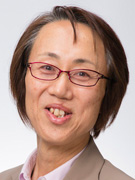Course of Human Sciences
Associate Professor IWAMOTO Takeyoshi (Sociology)
| [Theme] | Aiming for a society of open opportunity |
|---|

Do you feel that you were able to enroll in a university owing to your parents or through your own personal efforts? You could not have, of course, gotten into a college without some effort on your part. However, even here in Japan, there are still more than a few people who give up on going to college for financial reasons, even though some schools have inexpensive tuition.
Let us try broadening our focus to include the rest of the world. Within the story "If the World Were a Village of 100 People" (Magazine House, Ltd.) that spread worldwide via the internet, there is a line that states, "Among the villagers, 1 has a college education, 2 have computers." If we reverse this statement, then 99 out of 100 people would not have obtained college education. There are many children under the age of 18 who are included within these 99 people, but there are many who will not actually live until the age of 18.
So just what sort of society is a society that allows everyone to freely demonstrate their abilities? How can we bring ourselves closer to this sort of society?
I started my research with an analysis of disparities in educational opportunities. Alongside researchers from around the nation, I experienced the entire process of the SSM survey that targets several thousand people nationwide. From the survey in 1995, we were able to discern that depending upon the occupational group of the father, there was more than two times the disparity in the university advancement ratio among every age group even between two students with identical academic abilities in their third year of junior high school.
I also tried different approaches apart from quantitative analyses using data. What do advancement to college, occupation, and marriage have in common with each other?
With marriage (for the sake of simplicity, we will limit ourselves to heterosexual relationships), we should also recognize the choice amongst both men and women to remain single rather than getting married to an undesirable partner. Similarly, there is no need for people to force themselves to enter universities or companies they do not want to enter, or conversely, for universities and companies to accept people they do not want. Mathematically, this is a construct that is known as "social matching," which is characterized by a "two-sided preference" or both parties having the right to choose.
I have also expanded my study interests to include higher education systems (i.e., education beyond junior college or university). If the entrance exam system were to change, there would be vast differences in the universities that students would enter even if they had the same academic abilities and school preferences. I have also labored over reforms to systems that support the circulation of academic information. Working with the Japanese Sociological Society, I built a bibliographic information database. On the topic of the values and research ethics at the foundation of the academic world, I have also been involved in advancing inquiries based on foreign trends and the creation of ethical declarations for society. Of late, I am conducting and analyzing nationwide municipal surveys as part of a dual-purpose research project for training students. Last but not least, I also analyzed several items within a "college ranking" published by a major newspaper and clarified that the ranking was poorly organized and thus lacked real evidence.

